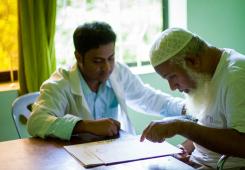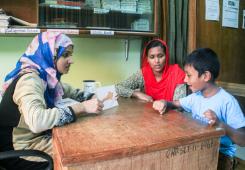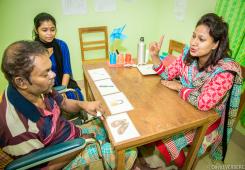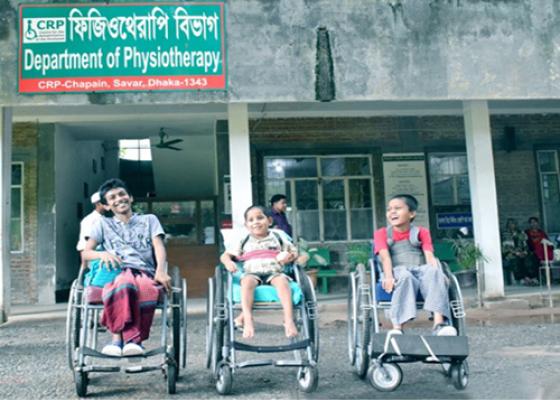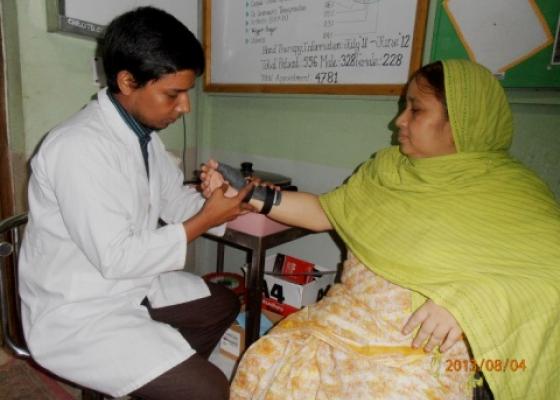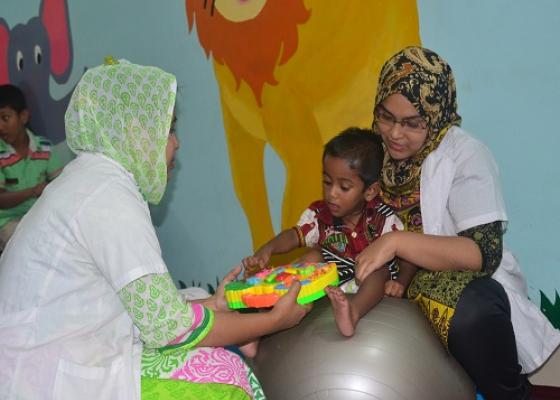Speech & Language Therapy Dept.
Speech & Language Therapy
Speech & Language Therapy (SLT) is the scientific and rehabilitative treatment of human communication disorders which includes disorders of speech, language, voice, fluency and swallowing. Speech & Language Therapists (SLTs) provide a wide range of services, mainly on an individual basis, but also as support for families, support groups, and providing information for the general public.
It is an established profession in many countries all around the world but is still growing profession in Bangladesh. There are Speech and Language Therapy departments in Savar, Mirpur, Chittagong, Barisal, Rajshashi, Sylhet, Moulovibazar, Manikgonj, Pabna and Mymensing.
1. Services Offered:
- Pediatrics Unit (indoor & outdoor): Pediatrics Unit (indoor & outdoor): Speech and Language Therapy (SLT) plays a crucial role in supporting children with various communication, feeding, and swallowing difficulties. SLTs work directly with children and their families to develop personalized strategies to support a child’s individual needs. SLTs deal children with Cerebral palsy, Speech/language delay/disorder, Articulation and phonological disorder, Cleft lip and palate, Hearing impairment, Stammering/stuttering, Autism Spectrum Disorder (ASD), Attention Deficit Hyperactive Disorder (ADHD), Down’s Syndrome, Voice disorder, Learning disability (dyslexia, specific language impairment (SLI), auditory processing disorder), Intellectual Disability, Craniofacial anomalies that adversely affect speech, language or cognitive development, Developmental verbal dyspraxia, Childhood Dysarthria, and Children with eating & drinking difficulties.
- Neurology Unit: The SLT is involved in supporting adult with neurological conditions such as Stroke, Traumatic Brain Injury, Motor neuron disease, Dementia, Alzheimer’s disease, Parkinson’s disease, Voice disorder, Dysfluency, Laryngectomy (post head/ neck cancer, Bell’s Palsy & Facial Palsy, Swallowing difficulties/dysphagia, Cognitive problem with the aim to improve, maintain or support speech, language, communication and swallowing skills, in order to enhance their overall quality of life.
- Stroke Rehabilitation Unit (Outdoor): It is a specialized rehabilitative service for the patients with stroke. SLTs are essential in stroke rehabilitation addressing communication, cognitive and swallowing difficulties, improving functional communication and supporting individuals in regaining their independence and quality of life.
- Spinal Cord Injury Rehabilitation Unit (Indoor): Speech & Language Therapists (SLTs) play an integral and active role on an inpatient rehabilitation of individuals with spinal cord injury (SCI). They provide assessment and treatment in the areas of swallowing, motor speech, voice, and cognitive–communication functioning. Specific Roles and Responsibilities of SLTs in SCI rehabilitation are: Swallowing Assessment and Therapy, Motor Speech and Voice Therapy, Cognitive-Communication Assessment and Treatment, Tracheostomy and Ventilator Management, Patient & Family Education and Collaboration with the Rehabilitation Team.
- Provision of Augmentative and alternative communication (AAC) System: SLTs play a vital role in the provision and implementation of AAC devices for individuals with severe language and communication impairments. They assess communication needs, determine suitable AAC systems (picture, picture books, picture board) according to patient’s need, provide training and support to individual AAC users to use a mixture of ways to communicate (gestures, picture books, symbol boards as well as speech) and collaborate with other professionals and AAC user to ensure effective communication
2. Role of Speech & Language Therapy
Speech and Language Therapists (SLTs) are experts in assessing, diagnosing, and treating communication and swallowing difficulties in people of all ages. They work to improve individuals' ability to communicate, understand and participate in life. The role of the Speech and Language Therapists (SLTs) are as follows:
- Assessment: Speech and language therapists (SLTs) evaluate a person's communication skills to identify areas of strength and weakness.
- Treatment: SLTs develop and implement individualized treatment/therapy plans and set specific goal depending on types of communication & swallowing disorder and patient’s need.
- Prevention: SLTs also work to prevent communication problems from developing or worsening.
- Individual Therapy (1:1): Pediatric inpatient, pediatric outpatient and adult outpatient service.
- Group Therapy: Preverbal group therapy, Autism group therapy, dysarthria group therapy, communication class).
- Providing education, training and counseling to families, teachers and employers about the needs of people who find listening, talking, reading and writing difficult.
- Referring children for other service if necessary.
- Follow-up
- Working in Multi-Disciplinary team (MDT) approach.
Academic Program: CRP’s academic institute ‘Bangladesh Health Professions Institute’ provides an educational program for obtaining B.Sc. in Speech and language Therapy.
Research: SLTs conduct research related to communication sciences and disorders, swallowing disorders. Experimental, empirical, and scientific methodologies that build on hypothesis testing and logical, deductive reasoning have dominated research in speech & language therapy. Other types of research in the field are complemented by qualitative research.
International Links: Speech and language therapy department receives support from different countries around the world. Many experts from Canada, Australia, UK, USA have helped with training and establishment of the new profession in Bangladesh. Speech and language therapists from these countries regularly work as volunteers in CRP and support the department.
For further information please contact:
Head of Speech & Language Therapy Department
E-mail: tahmina.sultana@crp-bangladesh.org

